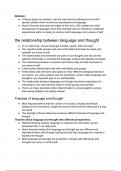Nativism:
● A theory based on innatism, with the view that the individual is born with
genetic abilities which include the development of language
● Noam Chomsky has been the leader of this view, LAD enables the initial
development of language which then interacts with an individual’s childhood
experiences within a society to produce both languages and a sense of self
the relationship between language and thought
● In our daily lives, we use language to listen, speak, write and read
● Our cognitive skills process and store information that helps to create and
maintain our sense of self
● The stored ideas and memories are parts of our thoughts and we use this
selected information to interpret the language, actions and attitudes of people
● This relationship between ourselves and others helps to build the blocks of
our sense of self
● It also builds relationships with other individuals and groups
● These ideas and memories also apply to many different changing strands of
our culture, our value systems and our interaction, which makes language and
thought a very important part of our self-identities
● The relationship between language and thought has direct implications for
individuals in the way that they relate to social groups around them
● There are many examples where discrimination is voiced against a group,
them being labelled and unfairly treated
Theories of language and thought
● Most linguists believe that the culture of a society, including its lifestyle,
traditions and innovations, shape the way we think and this influences the way
we speak
● The strength of these influences produces different theories of language and
thought
Theories about language and thought take different perspectives:
● Rational thinking requires language to organise the information we are
presented with in our daily lives
● Some linguists believe that language and thought are two different and
separate entities, with thought coming first and then language as a vehicle to
express the thought
● Both language and thought are essential to interact with individuals and
thoughts we come in contact with
, The Sapir-Whorf hypothesis
● Developed by Edward Sapir and Benjamin Lee Whorf in 1929, gained
momentum in the 1950s
● The hypothesis supports the idea that the words and grammar of a
language directly shape the thoughts of its speakers
● This idea supports that language shapes how the speaker views the world
A well-known example:
● English only has 1 word for snow, meanwhile, the Inuit tribes of the Arctic
have 3 words for its different properties
● The hypothesis claims that the Inuit people can think of a more subtle way
about the snow because their language contains more distinguished forms of
that particular weather condition
● This is the example adopted by the hypothesis
● Arabic also has 13 words for love and each of them conveys a different stage
of falling in love, while English doesn’t have that
Overall, the ideas relating to the link between language and thought are as
follows:
Linguistic determinism:
● The idea that a structure of a language determines the thought process of the
speaker
● Language determines the way we speak and society is confined by its
language
● The words we use directly frame our thoughts
Linguistic reflectionism:
● The idea that a language reflects the thoughts and ideas of a culture
● The language which is used only reflects the thoughts of the speaker, so
language influences the way people view their world but doesn’t determine it
● The opposite of linguistic determinism
Linguistic relativity:
● The idea that the structure of a language affects a person’s view of the world,
either very directly (linguistic determinism) or as a much more indirect, weaker
influence (linguistic reflectionism)
● This is the general overall idea, which states that the structure of a language
influences the way the speakers view the world
● This conclusion was made through a study of the lexis and syntax available in
different languages




